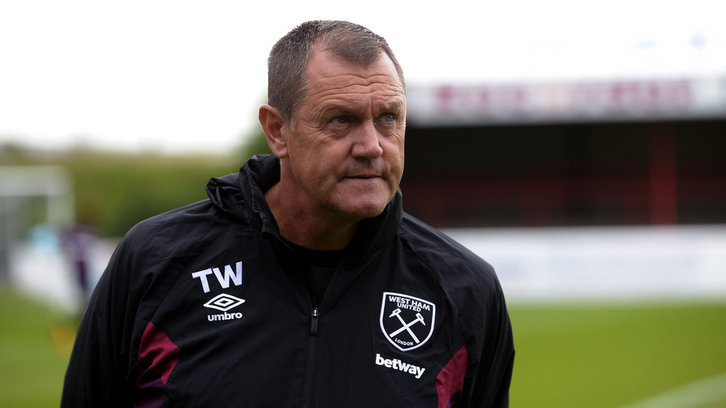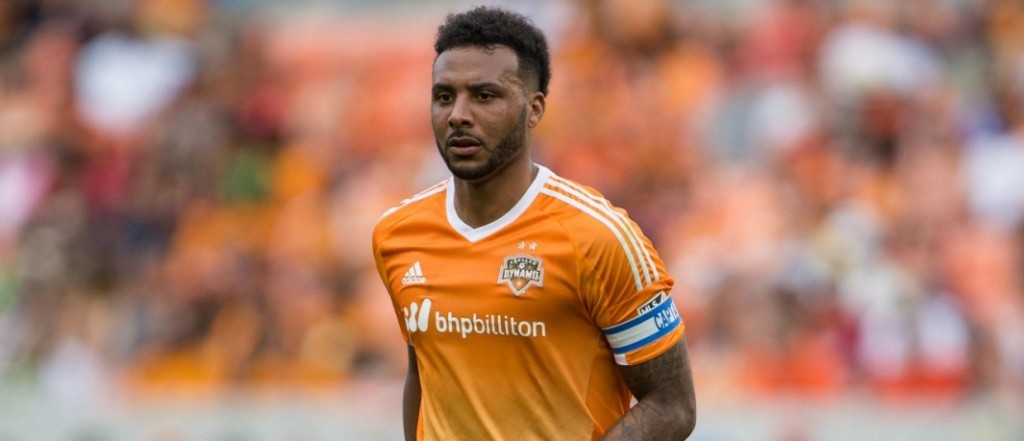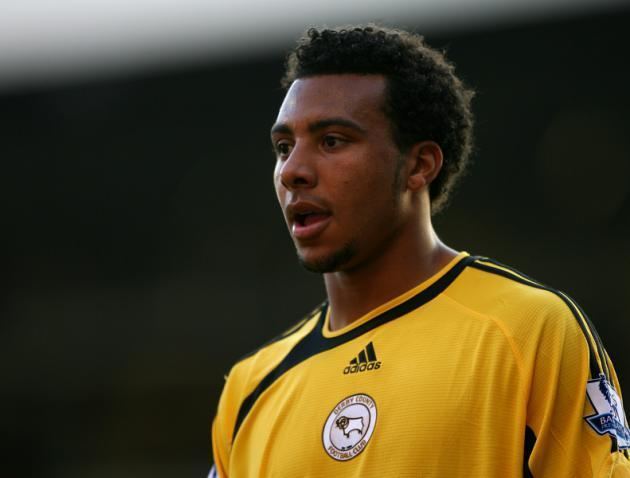The first time Derby County became aware of Giles Barnes, he was wearing a red shirt and appearing at centre back.
Aged 14, Barnes was a Nottingham Forest product. By the time he lined up against Derby, he was training and playing with their under-19s and slowly being integrated into the first team squad. “I’m not being funny, but it was easy playing at centre back.” Barnes, already a winger, was simply slotting in at the back for some education. He was levels beyond youth football.
That was the first day of his tumultuous relationship with Derby . So impressed were they by Barnes the defender that he was approached at full-time to move across the Midlands. Forest were on the brink of relegation to League One, Derby with ambitions of the Premier League. Like his outing at the back, the decision to make was easy.
Derby were also on the brink of their move to Moor Farm. Still in its infancy, the training base was a significant draw for personnel of any age. A different world to the Ramarena on Raynesway, it meant enormous progression for the club, a base that would now line up with the stadium. The actual academy though spoke for itself more than any patch of land could. It had already produced Lee’s Grant and Camp, Tom Huddlestone and Marcus Tudgay within two years of one another. Most importantly though, it had Terry Westley heading up operations after moving from Rushden & Diamonds. Under Westley’s tutelage, a new generation had found their pathway into the first team.
“I don’t have enough words or time to tell you about my gratitude to Terry, he was basically my stepdad. Lewin (Nyatanga) or Miles (Addison) might have told you but me and Terry had a bond that went beyond football.”
It’s the relationship that matured Barnes as both a footballer and as a man. When he looks back at those who influenced him from an early age, there’s a list. In his first full season, he roomed with Darren Moore. His evenings would be spent making mixtapes and watching whatever Moore wanted to on TV. “He used to ask me to make him CDs. He loves r&b so he’d be like ‘Barnesy, we’re in the room this weekend. Make me a CD, slow jam.’
“There were times I wouldn’t play well and Darren would tell me. That was important for me as a young boy that someone like Darren was expecting so much of me. There were games I thought I played okay but he expected so much of me. We had strict bedtimes, strict what could be on TV before the game. I was lucky to be surrounded by people who cared about me and people that were professional in how they conducted themselves.”
As well as Moore, he had club captain Michael Johnson to keep him grounded. “I was close to Michael who took me under his wing and I think he probably saw a little bit of himself in me and that’s maybe what drew me to him. Some of his jokes I eventually used and still do today. Even when I see him now we still laugh about the same stuff and still call each other by the same nicknames that he’d call me at 15 years old.”

(Photo by Arfa Griffiths/West Ham United via Getty Images)
Moore and Johnson were passing figures in Barnes’ career, Westley has always been the constant. And it should be little surprise, considering the portfolio of talent he has delivered to the Premier League, that he’s so adored by Barnes. He’s the man who is credited with the development of dozens of those who have had such a significant impact on the top flight of English fooball. Declan Rice at West Ham is the most recent example, but at Charlton he mentored Scott Parker and Paul Konchesky. At Ipswich, Kieron Dyer and Matt Upson came through his development. Barnes was merely the latest star to mould. “As a young boy, if you can get yourself a Terry Westley, you have landed in gold. He knows talent when he sees it and he knows how to get the best out of people.
“I will never forget we played at Crewe in the youth team and I’d been with the reserves and I didn’t want to play in the youth team. I felt it would be more detrimental than being with the reserves. He convinced me to come and I didn’t play well at all and his punishment to me was ‘you’re out of the reserves for the next two weeks.’ He knew what was best for you at the time, it was for my development as a player and the fact I went down there and didn’t play well showed me that you don’t get rewarded for playing badly. He said I didn’t play well enough so I didn’t deserve to be there. As a young boy it’s what you need.”
The reserves were just a stepping stone, even if he was only a kid. He’d already been slowly introduced to first team football in Phil Brown’s disastrous spell in charge, but Westley’s appointment on a caretaker basis was the moment Barnes’ career propelled. “Giles may be one of the most talented boys I’ve ever worked with in terms of raw talent” remembers Westley.
“We played Crystal Palace when Iain Dowie was the manager and Ben Watson was in midfield. It was one of Giles’ first games and Dowie said to me ‘who the fuck is that?’ because he was just running past people. I remember Colchester away, Phil put on Dean Holdsworth instead of him and that was the straw that broke the camel’s back. That finished him. I never went in the manager’s office when I was caretaker because I said ‘look, I’m not the manager, I’m the academy manager’ and I never went down there to do that. But I pulled Giles in and said ‘do you think you should have been playing?’ and he said ‘you know I should have been.’”
That final comment from Barnes is one which sits on the fine line between the confidence and arrogance that was often confused around his game in those early years. Whether it was his love of a stepover or the stories that emerged of him saying ‘whoosh’ when passing defenders, that level of confidence didn’t sit well with some. Paul Peschisolido remembers “Barnesy was a difficult one because he had to keep his head down as he could get a little arrogant. We had a lot of senior pros who would pull him to one side.”
As the British press has done with many before and since Barnes, they treated confidence as an unwanted trait in their young players. A 2007 article in the WalesOnline wrote “It’s only a matter of time before some centre-half deposits him into row Z – probably no bad thing for the youngster’s sense of his own importance.” The issue was that such was Barnes’ talent, Welsh hoofers couldn’t get close enough to physically assault him.
Arrogance or not, Barnes was special and he knew it. He’d been elevated five years above his age group, made his first team debut less than a month after his 17th birthday and had the running of established Championship level players in his first weeks as a professional. Assuredness on the field was matched by a humility driven into him off it. Westley and co did what they could to keep him grounded. “I travelled with the first team every game and I used to pick up the kit, let them throw slips at me before I even kicked a ball with them. That helped me and when I finally got in it was an easy transition.”
Everything was easy for Barnes. Under Billy Davies, football was easy. A superb volley away at Cardiff was celebrated with pure nonchalance, as if it was simply what he did. A pirouette around the Sunderland defence at the Stadium of Light was executed with such ease that he simply jogged off after slotting home. Even at Wembley, when he took to the field with a broken foot masked only by a variety of painkilling injections, a driven cross into the path of Stephen Pearson was delivered with ease. He’d achieved promotion at 19, finished the campaign second on the appearances list and had barely broken sweat. West Ham came calling, a summer bid of £8 million was accepted, then rejected. Derby knew they’d be able to get more for a talent destined for the top.
Barnes’ fall from the heights expected of him in his first full season can be attributed to a number of factors. Injuries, many of them, stole almost three years of development away from him. At Wembley, he rebroke his foot to such an extent that when the squad was celebrating, he was alone in his room crying from the pain. In the Premier League season, an additional training session after a defeat at Wigan caused a knee injury so severe that he was told his career was over. “I went to the doctor, a Belgian specialist at the Nuffield in Derby, and had my scan. I’m thinking ‘hopefully this isn’t too bad’ but in my head I knew something wasn’t right, my knee was just grinding and giving out on me. I don’t know if he’d dealt with a kid before but he just sat me down and said ‘Yeah, I don’t think I can fix you and you probably won’t play again’. I’m with my dad and I just break down in tears. ‘We can fix it to some extent but it’s highly unlikely you’ll play football again.’ I was 18. 18.”
Thankfully, he and the club went in search of a second opinion. It was Dr Steadman, Colorado’s finest knee specialist and the man who would later go on to treat Shaun Barker, who would save Barnes’ footballing career.
Then, when out on loan at Fulham, his Achilles ruptured. When he got back to Derby and was rushed into a pre-season game he knew he wasn’t ready for, it ruptured again. “I was out for over two years. Two years before that I was on top of the world.” Barnes would leave Derby months later, first for West Brom and later Doncaster.

He’d find a home in America where his talent was truly appreciated at Houston Dynamo, before becoming a Jamaican international and journeying to India for a stint working under Phil Brown at Hyderabad.
Derby is still the real home though and a place he always seems to find himself gravitating towards. “I almost went back in 2015. If it wasn’t for the MLS and my club not allowing it, I would have been signing. The first one was a loan to a permanent, but the MLS and Houston said no, the second was permanent. That was under both Clement and McClaren. Gary Rowett tried to get me at Birmingham as well.”
It’s a city that runs through the Barnes blood. He might have been born in Barking, but he was matured in Derby. And the city only grew in importane when he watched his brother Marcus debut as a professional for Southampton in their 2019 FA Cup tie at Pride Park. “I hadn’t been back to the stadium until last year actually. We both made our bows there, he began his journey at the stadium that I played on so many times and loved. That was such a great experience. He grew up watching me there so for him it was a magical moment and I was the first phone call he made. I watched my little brother step out and it was more special for me watching him than it was for me when I made my debut. He’s a lot younger but when you care for someone so much, it was so special.”
Today, in peak Covid-19 crisis, Barnes is relaxing in Orlando. After his switch to Derby was denied, it was a logical next move. After all, the two cities are bursting with similarities. Right? No matter where the game has taken him though, he’ll never forget those years in Derby. And why would he? Life was easy.
